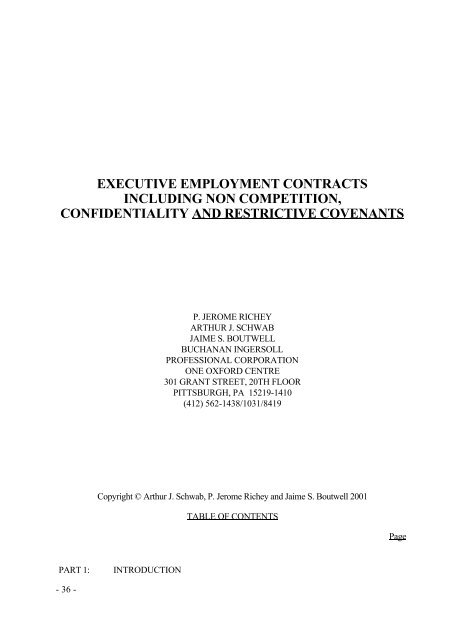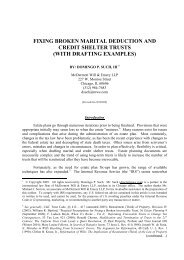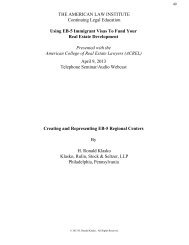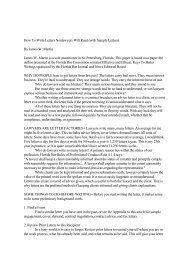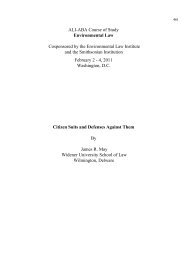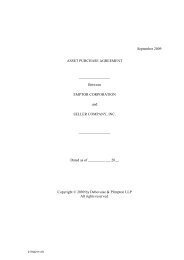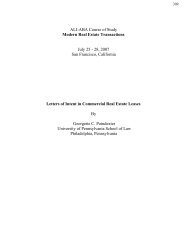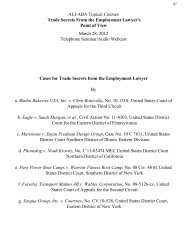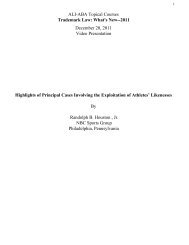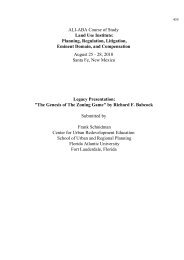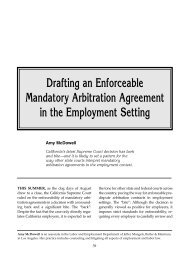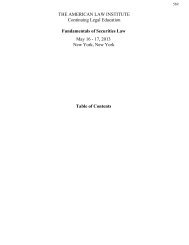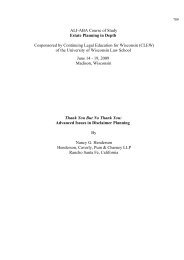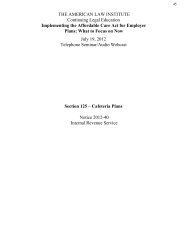executive employment contracts including non ... - ALI CLE
executive employment contracts including non ... - ALI CLE
executive employment contracts including non ... - ALI CLE
Create successful ePaper yourself
Turn your PDF publications into a flip-book with our unique Google optimized e-Paper software.
A.Need to be aware of potential pitfalls.PART 1: INTRODUCTIONCertain problems and pitfalls recur regularly in restrictive covenant cases. An experiencedpractitioner who is aware of these problems and pitfalls may, however, be able to avoid themby carefully drafting an <strong>employment</strong> agreement. Compare Seligam and Latz of Pittsburgh,Inc. v. Vernillo, 114 A.2d 672 (1955) (holding restrictive covenant enforceable againstformer employee who memorized customers' names and formed new salon) with ReneeBeauty Salon, Inc. v. Blose-Venable, 661 A.2d 847 (Pa. 1995) (holding salon withoutrestrictive covenant unable to enjoin former employee who memorized customer names fromcompeting). Similarly, in the do-it-yesterday rush that may accompany an employer'sattempts to enforce a covenant through a preliminary injunction, advance knowledge of thesespecial issues will help the practitioner make an appropriate attack.B.This discussion highlights some of the common problems often seen in these cases.1.Problems relating to validity.a.Consideration and continued <strong>employment</strong>;b.Overbreadth.2.Particular protection problems.a.Confidential information;b.Nonraiding, inventions and work for hire, and <strong>non</strong>solicitation of customers;c.Duties and acknowledgment of other opportunities;d.Review by counsel.3.Problems relating to damages and injunctive relief.a.Acknowledgment of venue and jurisdiction;b.Liquidated damages;c.Equitable bars;d.Period of injunction.4.Choice of law.C.Caveat: States often have widely varying approaches to these problems. Some suggestedsolutions may or may not be enforceable in a given state.- 36 -
PART 2: CONSIDERATION AND CONTINUED EMPLOYMENTA.The general rule of contract law is that a contract is unenforceable unless supported byconsideration. 6A Arthur L. Corbin, Corbin on Contracts § 1395 (2d ed. 1962 & Supp.1997). Consideration must be mutual, that is, A must provide consideration to B, and B mustprovide consideration to A.1.In the case in which an employer conditions an offer of <strong>employment</strong> upon the employeeagreeing to the terms of a restrictive covenant, the <strong>employment</strong> is the considerationfor the covenant. National Business Services Inc. v. Wright, 2 F. Supp. 2d 701,707-08 (E.D. Pa. 1998) (holding the restrictive covenants enforceable because theywere part of the formation of the <strong>employment</strong> relationship). But see Rousana Co. v.Garland, 204 F. Supp. 70 (D.P.R. 1962); Associated Dairies, Inc. v. Ray MossFarms, 205 Tenn. 268, 326 S.W.2d 458 (1959) (at-will contract will not support arestrictive covenant).2.But a restrictive covenant in an at-will <strong>employment</strong> contract militates against the grant of aninjunction. Ma & Pa, Inc. v. Kelly, 342 N.W.2d 500 (Iowa 1984). But seeCampbell Soup Co. v. Desatnick, 58 F. Supp. 2d 477, 492 (D. N.J. 1999) (statingthat continued <strong>employment</strong> of an at-will employee upon his execution of <strong>non</strong>-competeagreement may constitute sufficient consideration under New York and New Jerseylaw).B.In many cases, however, the employer will conclude that a restrictive covenant is desired after theemployee has accepted <strong>employment</strong> and will prevail upon the employee to accept an<strong>employment</strong> agreement containing a restrictive covenant. Where the employee is employed atwill, the employer's consideration for the employee's acceptance of the restrictive covenantmay merely be an offer of continued <strong>employment</strong>.C.Several state courts have held that when employers implement restrictive covenants after<strong>employment</strong> has begun, the employer has not offered sufficient consideration to support arestrictive covenant. See generally, Ferdinand S. Tinio, Annotations, Sufficiency ofConsideration for Employee's Covenant Not to Compete, Entered Into After Inception ofEmployment, 51 A.L.R.3d 825 (1973).- 36 -1.Minnesota. Although the Minnesota Supreme Court held in Davies & Davies Agency, Inc.v. Davies, 298 N.W.2d 127 (Minn. 1980), that whether continued <strong>employment</strong> wasadequate consideration for a restrictive covenant depends on the facts of each case,that Court has subsequently held that Davies established a requirement thatconsideration "more" than mere continued <strong>employment</strong> be shown when the restrictivecovenant is entered into subsequent to the initial <strong>employment</strong> contract. NationalRecruiters, Inc. v. Cashman, 323 N.W.2d 736 (Minn. 1982). Under these cases,(1) an employee who signed a restrictive covenant four months after his <strong>employment</strong>began but was subsequently employed for ten years and received promotions andopportunities that other <strong>non</strong>signing employees did not receive, had received adequate
consideration, (2) an employee who signed an <strong>employment</strong> agreement eleven daysafter he began <strong>employment</strong> had not received adequate consideration, and(3) employees who began <strong>employment</strong> and were then, within the first one or twoweeks, required to sign restrictive covenants did not receive adequate consideration.2.North Carolina. In James C. Greene Co. v. Kelley, 134 S.E.2d 166 (N.C. 1964), theNorth Carolina Supreme Court found that there was inadequate consideration tosupport a restrictive covenant entered into one year after the beginning of<strong>employment</strong>, despite the employee's continued <strong>employment</strong> in fact with periodicsalary increases. This case was followed in Worth Chem. Corp. v. Freeman, 136S.E.2d 118 (N.C. 1964) (agreement signed 15 days after commencement of<strong>employment</strong> not supported by new consideration), and Engineering Assocs., Inc. v.Pankow, 150 S.E.2d 56 (N.C. 1966) (agreement signed three and one-half yearsafter commencement of <strong>employment</strong> not supported by new consideration). See alsoKadis v. Britt, 224 N.C. 154, 29 S.E.2d 543 (1944). See also The Reynolds &Reynolds Co. v. Tart, 955 F. Supp. 547, 553 (W.D.N.C. 1997) ("Assuming that theDefendants were employed before they signed their agreements, continued<strong>employment</strong> under unchanged terms cannot have provided consideration for theirwritten promises not to compete.") But see Whittaker General Med. Corp. v. Daniel,362 S.E.2d 302 (N.C. Ct. App. 1987), rev'd on other grounds, 379 S.E.2d 824(N.C.), cert. denied, 384 S.E.2d 531 (N.C. 1989) (a promise of promotion, grant ofpromotion or change in compensation from salary to commission constitutes valuableconsideration to support a <strong>non</strong>competition agreement).3.Ohio. In Morgan Lumber Sales Co. v. Toth, 41 Ohio Misc. 17, 321 N.E.2d 907 (1974),the Common Pleas Court of Franklin County, Ohio, held that a restrictive covenantsigned several months after the beginning of <strong>employment</strong> was solely for the benefitand protection of the employer and hence not supported by consideration. See alsoEtna Prods. Inc. v. Stofey, No. 953, 1981 WL 3784 at *3 (Ohio Ct. App. Sept. 28,1981). But see Avery Denison Corp. v. Kitsonas, 118 F. Supp. 2d 848, 851-52(S.D. Ohio 2000) (discussing the split among Ohio appellate courts as to whethercontinued <strong>employment</strong> after employee signs restrictive covenant is sufficientconsideration).4.Oregon. In McCombs v. McClelland, 354 P.2d 311 (Or. 1960), the Oregon SupremeCourt held that a continuing <strong>employment</strong> relationship was insufficient consideration fora restrictive covenant entered into approximately ten years after the employee beganwork. The court stressed that there was neither an express nor an implicit promise ofcontinued <strong>employment</strong> because the employer had not made signing the agreement acondition of future <strong>employment</strong>. But see Mail-Well Envelope Co. v. Saley, 497 P.2d364 (Or. 1972) (holding that where employee received salary increase underagreement, consideration was neither nominal nor grossly inadequate or in its termsotherwise unfair). In addition, note that Title 51 Or. Rev. Stat. § 653.295 allowsenforcement of restrictive covenants in <strong>employment</strong> agreements which are not entered- 36 -


